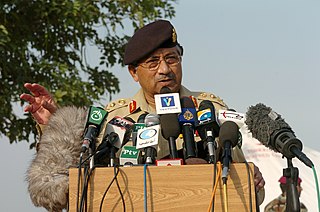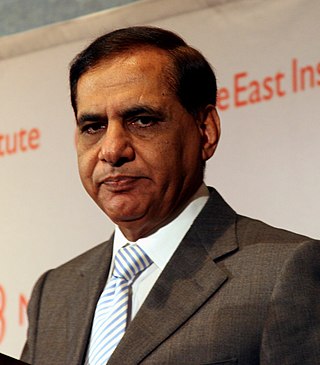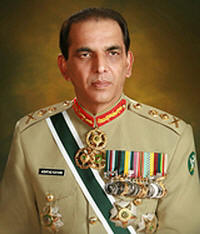
The Pakistan Muslim League Urdu: پاکستان مسلم لیگ (ق); Pākistān Muslim Līg (Qāf), Acronyms: PML(Q), PML-Q, PMLQ, "Q League" is a political party in Pakistan. As of the 2024 parliamentary election, it has a representation of 5 seats. It previously served as an ally of former Prime Minister Raja Pervez Ashraf's government, and led a joint election campaign in 2013 alongside Pakistan Peoples Party (PPP) in Punjab and Balochistan provinces against its rival Pakistan Muslim League (N), a fiscally conservative and centre-right force.

The National Security Council is a federal institutional and consultative body chaired by the Prime Minister of Pakistan as its chairman. The NSC is a principal forum that is mandated for considering national security and foreign policy matters with the senior national security advisers and Cabinet ministers. The idea and inception of National Security Council was first conceived in 1969 under the President Yahya Khan, its functions were to advise and assist the president and prime minister on national security and foreign policies.

General Mirza Aslam BegNI(M) HI(M) SBt LoM, also known as M. A. Beg, is a retired Pakistani four-star general who served as the third Chief of Army Staff of the Pakistan Army from 1988 until his retirement in 1991. His appointment as chief of army staff came when his predecessor, President General Muhammad Zia-ul-Haq, died in an air crash on 17 August 1988.

General Jehangir Karamat is a retired four-star rank military officer, diplomat, public intellectual, and a former professor of political science at the National Defense University. Prior to serving as a Chief of Army Staff, he also served as the 9th Chairman of the Joint Chiefs of Staff Committee from 1997 to 1998.

The Chairman Joint Chiefs of Staff Committee (CJCSC) is, in principle, the highest-ranking and senior most uniformed military officer, typically at four-star rank, in the Pakistan Armed Forces who serves as a Principal Staff Officer and a chief military adviser to the civilian government led by elected Prime minister of Pakistan and his/her National Security Council. The role of advisement is also extended to the elected members in the bicameral Parliament and the Ministry of Defence. The Chairman leads the meetings and coordinates the combined efforts of the Joint Chiefs of Staff Committee (JCSC), comprising the Chairman, the Chief of the Army Staff and Chief of the Air Staff and the Chief of the Naval Staff, Commandant of Marines, DG Coast Guards and Strategic Plans Division, and commanders of the service branches in the Civil Armed Forces and the National Guard.

Pakistan Military Academy, also referred to by its acronym PMA, is an officers training centre located near Kakul village in the city and district of Abbottabad, Khyber Pakhtunkhwa. Established in October 1948, it is the sole service academy in Pakistan tasked with training cadets to serve as army officers. For educational training, the institution is accredited by National University of Sciences & Technology.

The 1999 military takeover in Pakistan was a bloodless coup d'état initiated by the military staff at the Joint Staff HQ working under the Chairman of the Joint Chiefs of Staff Committee and Chief of Army Staff General Pervez Musharraf. The instigators seized control of the civilian government of the publicly elected Prime Minister Nawaz Sharif on 12 October 1999. On 14 October, General Musharraf, acting as the country's Chief Executive, issued a controversial provisional order that suspended the Constitution of Pakistan.

General Muhammad Aziz KhanNI(M) HI(M) SBt TBt, best known as Aziz Khan, is a retired Pakistani four-star rank army general who served as the 11th Chairman of the Joint Chiefs of Staff Committee, appointed in October 2001 until his retirement in 2005.

Admiral Fasih BokhariNI(M) HI(M) SI(M) SBt PGAT was a Pakistani admiral who served as the Chief of Naval Staff from 1997 to 1999. He was a well-known pacifist and a prominent political figure as the Chief of Naval Staff from 1997 until his voluntary resignation in 1999, which stemmed from his staunch opposition to the then-Pakistani President Pervez Musharraf's instigation of the Kargil War with India, a conflict that Bokhari reportedly saw as an act of inappropriate and uncoordinated aggression from Pakistan and one that subsequently led him into a bitter dispute with Musharraf. Bokhari also served as the chairman of the National Accountability Bureau, a Pakistani anti-corruption agency.
Lieutenant General Ali Kuli Khan KhattakHI(M) is a retired Pakistani three-star rank general officer and former field commander of X Corps.

Yusuf Raza Gilani is a Pakistani politician who served as the 16th prime minister of Pakistan from 2008 to 2012. He is a veteran of Pakistan People's Party, and is currently serving as the vice-chairman of the party's Central Executive Committee, and in 2021 was elected as a Senator and his term ended when he took oath as a Member of the National Assembly of Pakistan on 29 February 2024 and vacated the seat on 22 March 2024.

Mahmud Ali Durrani, is a retired Pakistani two-star rank general officer, author of security studies, and a former National Security Advisor to the Pakistani government, serving from 2008 until his termination in 2009.

General Ehsan ul Haq NI(M), HI(M), is a retired four-star rank army general in the Pakistan Army and a public official, served as the 12th Chairman of the Joint Chiefs of Staff Committee, appointed in October 2005 until his retirement in 2007.

The insurgency in Khyber Pakhtunkhwa, also known as the War in North-West Pakistan or Pakistan's war on terror, is an ongoing armed conflict involving Pakistan and Islamist militant groups such as the Tehrik-i-Taliban Pakistan (TTP), Jundallah, Lashkar-e-Islam (LeI), TNSM, al-Qaeda, and their Central Asian allies such as the ISIL–Khorasan (ISIL), Islamic Movement of Uzbekistan, East Turkistan Movement, Emirate of Caucasus, and elements of organized crime. Formerly a war, it is now a low-level insurgency as of 2017.

General Ashfaq Parvez KayaniNI(M) HI(C) HI(M) LoM LoH OMM, is a retired four-star general of the Pakistan Army who served as the eighth chief of army staff, being appointed on 29 November 2007 after his predecessor Pervez Musharraf retired from his military service and remained in the office until 29 November 2013.

General Tariq MajidNI(M) HI(M) LoH is a retired four-star rank army general in the Pakistan Army who served as the 13th Chairman of the Joint Chiefs of Staff Committee from 2007 to 2010, the principal and highest-ranking military adviser in the Pakistan Armed Forces.

The Battle of Bajaur, also known as Operation Sherdil, was a military campaign in the Bajaur region of Pakistan. It was conducted on 7 August 2008 by the Frontier Corps and Infantry Brigade of Pakistan army. The operation was primarily launched to end the political movement of the Tehrik-e-Taliban Pakistan. Bajaur area was administered by Tehrik-e-Taliban Pakistan until 2007, and it remained Al-Qaeda's central command and control for carrying out activities in Northeast Afghanistan and Kunar province. Recent reports indicate that ongoing conflict has newly displaced an estimate of 7,000 people between 3 and 4 March in Nurgal district.

Chief of the General Staff is the most coveted position within the Pakistan Army after that of the Chief of the Army Staff (COAS). Although four-star Chief of the Army Staff is the head of the land forces, CGS is "the organisational lead on both intelligence and operations" hence being in charge of the MI and MO Directorates. Since 1985 a three-star lieutenant general is appointed to the post of CGS.
The Gang of Four was a quantified and common colloquial implicit term for a set of four military leaders in the Pakistan military who were central figures in the military dictatorship in Pakistan wherein generals and admirals of the Pakistan Armed Forces had control over the country. This specific quantified set was briefed in the classified intelligence matters by the executive branches of the government. It was first related to the President General Zia-ul-Haq, and staffers of his administration including General Akhtar Rahman, Khalid Mahmud Arif, and Zahid Ali Akbar.

General Nadeem Raza NI(M), HI(M) is a retired four-star army general of the Pakistan Army who got commissioned in 10 Sind Regiment in September 1985. He served 17th Chairman Joint Chiefs of Staff Committee. Raza was previously the Corps Commander of the X Corps (Pakistan) and CGS and General Officer Commanding 9th infantry division, Wana and Commandant of the Pakistan Military Academy.























